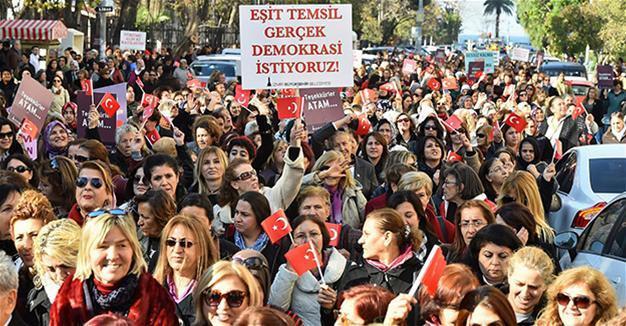Why Turkish women are no ladies
Nazlan Ertan

DHA photo
The scene is the conference hall of the İzmir Bar Association. The occasion is the 82nd anniversary of Turkish women’s suffrage. As Turks never get tired of telling you, in voices that drop an octave in admiration of a glorious/glorified past, Turkish women obtained the right to vote and be elected before some of their European sisters, thanks to the nation’s founder, Mustafa Kemal Atatürk. Fortunately, the panel organized by the bar’s leading figure on women’s legal rights, Nuriye Kadan, did not focus on the past, but instead focused on the gloomy present. Titled “From the Right to Vote, to Exclusion,” the subject was the low participation rate of women in politics, business life and academia. But it does not take long for it to turn into a debate on semantics.A male professor, one of those jovial academic types, touched raw nerves when he deviated from his written text and made spontaneous statements on women in academia. “There are many ladies among our colleagues. In certain departments, our lady colleagues outnumber us and they do well,” the professor said.
The audience (mainly young, female lawyers) stirred uneasily and after murmurs, several voiced: “’Woman’ [kadın] professor. We want to be referred to as women, not ladies [bayan/hanım].” They received a round of applause.
A quick note to non-Turkish speaking readers: In Turkish, “hanım” or “bayan” (translated as lady or ma’m) is a form of address for women, whereas “kadın” (woman) is the gender. Yet the simple issue of semantics has been a hot debate in life and print, with more and more people, some out of ignorance but others out of an ideological outlook, using “hanım” instead of “kadın.”
The professor looked around the hall surprised, slightly hurt at the female revolt against him. “Women?” he asked. “But I meant no disrespect, on the contrary. I am a great supporter of women’s rights. In academia, women are much better than us. I persistently choose my research assistants among a group of girls because they are more hard-working.”
The angry murmurs rose again: “Women, not girls.”
The professor’s face fell again. “But they are not women, they are unmarried girls,” he said, and later blushed a deep crimson, aware that he had touched on the sensitive issue of virginity. “I have some boys as assistants, too,” he added, in a hopeless effort to say that his terminology was not sexist but “a figure of speech” related to age.
It fell on one of the other speakers, Prof. Dr. Sengül Hablemitoğlu, a professor of law, an activist and the founder of Hablemitoğlu Ankara Institute, to clarify. “We, as a political point, like women to be called women,” she told her colleague. “Not ladies, not girls. An adult male is a man and an adult female is a woman.
Referring to women as ladies is a sign of a different outlook and a different ideology toward women,” she said.
The male professor looked even more baffled. “But I did not refer to you as ‘sisters’ [bacılar], did I?” he asked, crest-fallen. Nonetheless, as he continued to read his speech – possibly researched by one of his hard-working assistants – he made no more references to “ladies” in the workforce, instead focusing on women’s labor.
For many women activists, substituting “lady” for woman is a matter of policy, and it is no coincidence that conservative municipalities have renamed various towns’ women recreational centers as “ladies’ recreational centers” or “ladies’ sports centers.” The same goes for the use of the word “sister” (bacı). In the 1970s, the left-wing movement has referred to the Revolutionary Sisters. Like many of the pre-1980 points of the left, the Justice and Development Party (AKP) and its followers adopted the term and started referring to its “headscarved sisters” – a term often used sardonically by anti-AKP writers.
“How are we going to shout ‘Vote for Women’ when we cannot even say the word ‘women’?” Hablemitoğlu also said, briefly talking about the figures on women’s participation in politics. There are currently 14.9 percent women out of the total MPs in parliament, after the November 2015 elections. The number was higher, at 17.9 percent, after the June 2015 election, but when the parties prepared for early elections after the failure to form a government – launching more aggressive and more security-oriented campaigns in a country hit by terrorist attacks – one of the things they dropped were the number of women MP candidates.
Today, there is only one woman in cabinet, occupying the government’s traditional post as the Social and Family Affairs Minister. The post has taken many forms since its creation in the late 1980s, first as the State Minister for Women’s Issues. But despite a few notable exceptions, the women who have occupied the position – before and after the AKP – were mostly unheard-of, novice politicians who held the post briefly as their first – and generally last – ministerial position. Hablemitoğlu referred to this “token” presence as the “jacket-and-skirt politics” where women are present but outside powerful posts.
This may precisely be the reason why we need to be less like “ladies” as we continue to battle for women’s rights after 82 years of suffrage in Turkey.
















